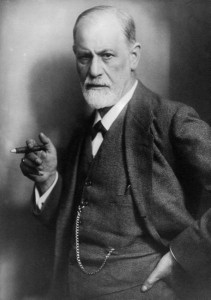
What does it mean to say that the subject of psychoanalysis is the ‘the soul’ rather than ‘the mind’? On Thursday 11th February, students met for the seminar ‘Freud in English: A Case Study of Translation’, as part of ECLA’s Annual Conference 2010. Led by ECLA faculty member Dr. Ewa Atanassow, the group involved discussion of questions arising from the ground-breaking work Freud and Man’s Soul, by Bruno Bettelheim.
Written in 1982, Freud and Man’s Soul took issue with the translations of Freud that had become established as the official English version of his work. This Standard Edition had previously been seen as the authority and became an established basis for psychoanalytic study and practise in the English speaking world, and as such, had deeply shaped the understanding of Freud among English-language readers.
Bettelheim’s exposition drew attention to Freudian concepts that had not only lost connotations present in the original German in their translation, but also gained new ones. A most crucial example of this is what Bettelheim sees as the eradication of references to “die Seele”: the soul. “Die seelische Organisation” (organisation of the soul), for example, is translated as “mental organisation”. This word loses not only the deep spiritual connotations of the original German, but also too its breadth. “Instinct”, too, occurs in the Standard Edition translations but is a word bearing a German equivalent that Freud chose to avoid, along with its deterministic, teleological connotations.
To Bettelheim, these examples – among many others – represent the obliteration of a Freud writing from a humanist position. Further, he wishes to show that this interpretive choice aimed to place Freud’s work firmly in a certain type of scientific tradition: a tradition which does not share the wider scope of the German term “Wissenschaft” but rather partakes of the more limited, positivistic connotations of the English “Science”. Bettelheim writes that, “There really was no reason – apart from a wish to interpret psychoanalysis as a medical specialty – for this corruption of Freud’s references to the soul” (p. 76).
Bettelheim is concerned with the extent to which Freudian psychoanalysis should be interpreted as an applied science under the wing of psychiatry, thus he is wary of translations with a more rigid, technical meaning that appear to manifest what is to Bettelheim a reductive motivation. Through examination of Bettelheim’s discussion it was seen that the interpretative work of translation had at stake not only Freud’s modelling of the psyche but also his views on the task of psychoanalysis itself and the nature of the human in general.
Such choices in translation have not been limited in their effect to the individual reader of Freud but have radically influenced the entire English speaking Freudian tradition and have also shaped the practise of psycho-analysis in the Anglo-American world. Bettelheim is especially critical of what he perceives as an emphasis on ‘adjustment’ in American psychoanalysis, which he attributes to the Standard Edition Freud translations. The motives for interpretation in the original translation, along with the rationale behind a certain manner of appropriation, were both discussed in the seminar. Further, consideration was also given to the wider influence of translated work.
A complication arose for the group, where the question was raised as to why Freud himself had given the Standard Edition his stamp of approval if it indeed was distortionary. In addition, the further issue was raised as to the impossibility of an interpretation which does not reflect the desires of the translator, or even, to a far lesser extent, the reader, in the original language.
Indeed, Bettelheim seemed to envisage in himself an affinity with Freud, and was careful to show how his life, in some respects, mirrored Freud’s; for example, in his move from Austria to an English speaking country. How honest – it was asked – was Bettelheim about the extent to which his critique of other translations was based upon his own desires, his interpretation of Freud’s vision? And further, how far was his own interpretation based on what he wanted Freud to have said?
Bettelheim, Bruno. Freud and Man’s Soul. 1st ed. New York: Knopf, 1982
by Lydia Azadpour (PY ’10, UK)
